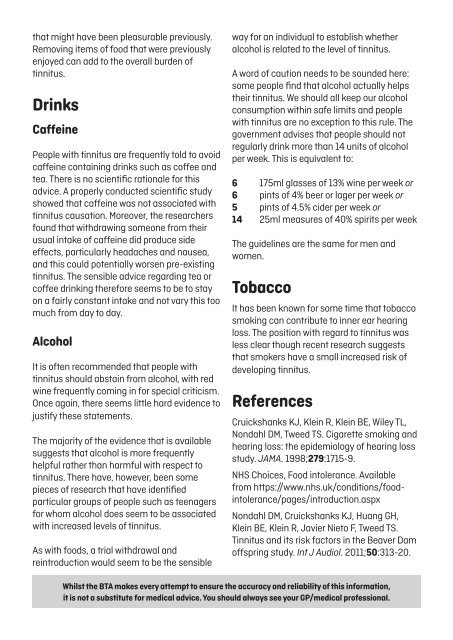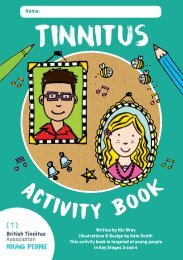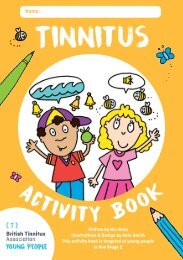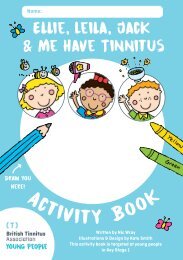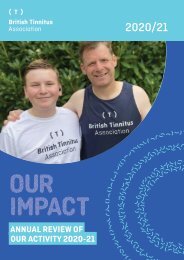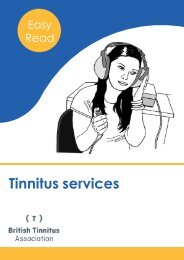Food drink and tinnitus Ver 2.0
Create successful ePaper yourself
Turn your PDF publications into a flip-book with our unique Google optimized e-Paper software.
that might have been pleasurable previously.<br />
Removing items of food that were previously<br />
enjoyed can add to the overall burden of<br />
<strong>tinnitus</strong>.<br />
Drinks<br />
Caffeine<br />
People with <strong>tinnitus</strong> are frequently told to avoid<br />
caffeine containing <strong>drink</strong>s such as coffee <strong>and</strong><br />
tea. There is no scientific rationale for this<br />
advice. A properly conducted scientific study<br />
showed that caffeine was not associated with<br />
<strong>tinnitus</strong> causation. Moreover, the researchers<br />
found that withdrawing someone from their<br />
usual intake of caffeine did produce side<br />
effects, particularly headaches <strong>and</strong> nausea,<br />
<strong>and</strong> this could potentially worsen pre-existing<br />
<strong>tinnitus</strong>. The sensible advice regarding tea or<br />
coffee <strong>drink</strong>ing therefore seems to be to stay<br />
on a fairly constant intake <strong>and</strong> not vary this too<br />
much from day to day.<br />
Alcohol<br />
It is often recommended that people with<br />
<strong>tinnitus</strong> should abstain from alcohol, with red<br />
wine frequently coming in for special criticism.<br />
Once again, there seems little hard evidence to<br />
justify these statements.<br />
The majority of the evidence that is available<br />
suggests that alcohol is more frequently<br />
helpful rather than harmful with respect to<br />
<strong>tinnitus</strong>. There have, however, been some<br />
pieces of research that have identified<br />
particular groups of people such as teenagers<br />
for whom alcohol does seem to be associated<br />
with increased levels of <strong>tinnitus</strong>.<br />
As with foods, a trial withdrawal <strong>and</strong><br />
reintroduction would seem to be the sensible<br />
way for an individual to establish whether<br />
alcohol is related to the level of <strong>tinnitus</strong>.<br />
A word of caution needs to be sounded here:<br />
some people find that alcohol actually helps<br />
their <strong>tinnitus</strong>. We should all keep our alcohol<br />
consumption within safe limits <strong>and</strong> people<br />
with <strong>tinnitus</strong> are no exception to this rule. The<br />
government advises that people should not<br />
regularly <strong>drink</strong> more than 14 units of alcohol<br />
per week. This is equivalent to:<br />
6 175ml glasses of 13% wine per week or<br />
6 pints of 4% beer or lager per week or<br />
5 pints of 4.5% cider per week or<br />
14 25ml measures of 40% spirits per week<br />
The guidelines are the same for men <strong>and</strong><br />
women.<br />
Tobacco<br />
It has been known for some time that tobacco<br />
smoking can contribute to inner ear hearing<br />
loss. The position with regard to <strong>tinnitus</strong> was<br />
less clear though recent research suggests<br />
that smokers have a small increased risk of<br />
developing <strong>tinnitus</strong>.<br />
References<br />
Cruickshanks KJ, Klein R, Klein BE, Wiley TL,<br />
Nondahl DM, Tweed TS. Cigarette smoking <strong>and</strong><br />
hearing loss: the epidemiology of hearing loss<br />
study. JAMA. 1998;279:1715-9.<br />
NHS Choices, <strong>Food</strong> intolerance. Available<br />
from https://www.nhs.uk/conditions/foodintolerance/pages/introduction.aspx<br />
Nondahl DM, Cruickshanks KJ, Huang GH,<br />
Klein BE, Klein R, Javier Nieto F, Tweed TS.<br />
Tinnitus <strong>and</strong> its risk factors in the Beaver Dam<br />
offspring study. Int J Audiol. 2011;50:313-20.<br />
Whilst the BTA makes every attempt to ensure the accuracy <strong>and</strong> reliability of this information,<br />
it is not a substitute for medical advice. You should always see your GP/medical professional.


